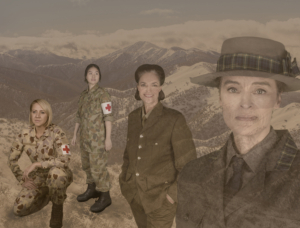EDINBURGH 2019: HALLOWED GROUND- WOMEN DOCTORS IN WAR Q&A

BWW catches up with The Shift Theatre to chat about bringing Hallowed Ground to the 2019 Edinburgh Festival Fringe.
Tell us a bit about Hallowed Ground- Women Doctors in War.
Hallowed Ground - Women Doctors in War is the result of two years of research and investigation into the real-life experiences of Australian women doctors in the military throughout the past century. Lilian, a surgeon in her fifties, denied military service in Australia in World War One, travels abroad to join The Scottish Women's Hospital, serving in the remote Balkan snowfields.
In World War Two, Mary, a specialist radiologist, she too denied service with the Australian Army, finds herself the only woman among 3000 British troops bound for the Middle East. As a peacekeeper on active service in Iraq, young doctor Tam, plagued by dreams of fleeing war-torn Saigon, reconciles her own refugee experience while rehabilitating the displaced Kurdish people. Catherine, a surgeon in Afghanistan, reflects on the journeys of the remarkable women who paved the way for her own experience as a modern military doctor.
Why is it important to tell these stories?
The written text of the play is inspired by personal diaries, historical documents, face to face interviews and in particular a unique ongoing collaboration with Professor Susan Neuhaus who served as a surgeon in Afghanistan and elsewhere, her career with the Australian army spanning over twenty years.
We have been so inspired by her journey. Her book co-written with Sharon Mascall-Dare; Not for Glory: A Century of Service by Medical Women to the Australian Army and it's Allies addressed her questions about her own profession and her desire to know how positions like hers came to be. Who came before her? Who were these women? What motivated them? Why don't we know these stories? How have women today benefited from their experience? These poignant questions resonated with us. How can we respond to these stories through our artistic practice? How can we contribute to their legacy for future generations? If these women could speak to each other - and to an audience- what would they say?
These questions moved us to create an innovative and immersive audience experience that inspires, educates and celebrates these extraordinary women and their achievements.
Why does it feel like a homecoming bringing these stories to Edinburgh?
Dr Lilian Violet Cooper was just one of over a dozen Australian women doctors who, having been rejected by the Australian military, paid their way to Europe to serve in the First World War. Some served in military hospitals in Britain and France. Others, including Lilian, served on the Eastern Front under the banner of the Scottish Womens Hospitals.
As part of small largely 'Anzac' team, led by Dr Agnes Bennett, Dobraveni dressing station, an outpost of the main hospital, opened just before Christmas 1916. There, under immensely harsh conditions Dr Cooper worked as a battlefield surgeon treating hundreds of wounded soldiers, performing debridements and amputations. It was a bitter winter and the population was starving. The women operated in mittens and treated patients on straw pallets in the snow. They were in constant danger, within range of the guns and the only means of retreat was on foot, down a treacherous mountain slope.
When eventually she became too unwell to continue, Lilian was replaced by another Australian, Dr Mary de Garis. Doctors Bennett, Cooper, DeGaris and Dr Jessie Scott of New Zealand, along with ambulance driver Miss Josephine Bennett, were each awarded the Medal of St Sava. Although not recognised in Australia, these women serve as standard bearers for later generations: through the Second World War, Vietnam, peacekeeping, and recent Middle East operations. It's thanks to the Scottish Women's Hospitals based in Edinburgh, that many Australian women were able to find their place.
How has the show been received so far?
Coming out to meet and greet the audience after the show, to mingle and listen to the connections people have to these stories is a continual discovery for us as a cast. Women and men alike sharing their own experiences, whether they are directly connected through family or a story that they know of.
Men and women openly sharing their PTSD experiences after active service, women sharing stories of their great aunts who served with the Scottish Women's Hospitals...the after show conversations are always illuminating!
What is the aim of The Shift Theatre?
The Shift Theatre is focused on presenting dynamic works with strong roles for women, both from existing texts and in the development of new works. Our aim is to provide a stimulating and collaborative platform for directors, actors and a creative team who share our vision for a vibrant ensemble company and stories that capture the heart and the imagination.
https://tickets.edfringe.com/whats-on/hallowed-ground-women-doctors-in-war
Sponsored content
Comments

Videos

